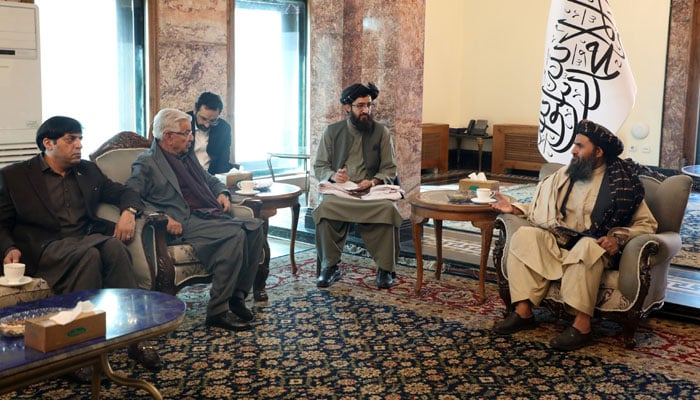Between Kabul and Islamabad, the hot border of terrorism
Pakistan has sent a delegation to Afghanistan to facilitate trade between the two countries, but diplomatic relations remain strained, according to analyst Riccardo Valle, co-founder of the Khorasan Diary, a platform for journalists, researchers, and academics. Attacks by the Pakistani Taliban continue to be a thorn for Islamabad. Meanwhile, Afghanistan is grappling with the Afghan branch of the Islamic State.
Milan (AsiaNews) – Pakistan has sent a delegation led by the Secretary of Commerce to Kabul to discuss the possibility of increasing bilateral trade, officials from both countries reported, noting that talks would be held today.
Yet only a few days ago the Pakistani Minister of Defence threatened to close border crossings and block (for the umpteenth time) the transit of goods to-and-from Afghanistan, after the Pakistani Air Force conducted two air strikes on Afghan soil as part of “anti-terrorist operations" that, according to the Taliban, killed eight civilians.
"Relations between Pakistan and Afghanistan will continue to be like this for the foreseeable future, characterised by skirmishes and mutual provocations, because the two countries are at an impasse,” said Riccardo Valle, analyst and co-founder of The Khorasan Diary, an online platform that monitors terrorist activities in Pakistan and South Asia.
"Islamabad rightly claims that the leaders of the Pakistani Taliban are in Afghanistan. However, the cells carrying out the attacks in Pakistan are actually on Pakistani territory, after the Tehreek-e Taliban Pakistan managed to bring most of its militants from Afghanistan back to Pakistan.”
The Tehreek-e Taliban Pakistan (TTP), the Pakistani Taliban, brings under its wing several Islamist groups, whose aim is to establish an Islamic Emirate in Pakistan on the Afghan model.
After Islamabad launched an offensive against them in 2014, Operation Zarb-e-Azb, most of the TTP found refuge in the tribal areas between the two countries.
“Families and communities that have cross-border affiliations still live today at the Torkham border crossing, in Khyber Pakhtunkhwa province,” Valle said.
But in past few of years, galvanised by the victory of their Afghan "cousins" over foreign forces who left Afghanistan in August 2021, the Pakistani Taliban carried out an increasing number of attacks against the Pakistani government and its security forces.
"To put it simply: Islamabad sees the TTPs as an entity based in Afghanistan that acts with the support of Kabul, while the Afghan Taliban, who have managed to make sure that the TTP is not a threat in their country, see the issue of attacks as a purely Pakistani problem," Valle noted.
"There has been a progressive hardening on the part of the Pakistani military so that now, contrary to when Prime Minister Imran Khan was in power, it is no longer possible to negotiate with Kabul over the TTP.
“On the other hand, the Afghan leadership cannot even take repressive measures against the TTP, because it risks generating a war between factions and drive some fighters to the Islamic State”.
By opposing the Islamic Emirate of Afghanistan, considered too soft in terms of Islamist ideology, the TTP managed to recruit several "disgruntled" Taliban in recent years.
Riccardo Valle, along with other experts, published a series of articles noting that the Afghan branch of the Islamic State in Khorasan (IS-K) was shifting its focus to Russia as a target.
“On the one hand, the Taliban, since taking power in 2021, have managed to weaken the Islamic State by decapitating its chain of command. On the other, the IS-K has shown that it is capable of changing tactics to conduct its attacks, a fact that for them is equivalent to a victory,” Valle explained.
“The Islamic State survives thanks to a narrative and ideological strand that are adapted to the contingencies of the moment. Just as they railed against the previous Afghan government, for example, they are now critical of the Taliban.
"A number of factors come together vis-à-vis Moscow. On the one hand, Russia is considered on a par with Iran, a supporter of the Syrian regime of Bashar al-Assad who wiped out ISIS from the territories it had managed to seize in Iraq and Syria.
"In the specific case of the Afghan branch of the Islamic State, however, the Taliban are criticised and accused of treason for the fact that they maintain diplomatic relations with Russia, the same country that invaded Afghanistan in 1979.
"And again, the Russians, and in particular the Wagner mercenary group are considered the 'new crusaders' fighting in Africa in lieu of the French, who instead have withdrawn from several areas in the Sahel where the Islamic State is very active.”
Although Washington considers relations between Afghanistan and Pakistan to be of some importance, for Valle, "it is hard to imagine that the United States can act as a mediator.”
"After the exchange of missiles between Iran and Pakistan, only China offered to act as an intermediary, [as Beijing is] seen as a much more credible actor, along with Russia, than the West. Now Afghanistan and everything that rotates around it is deemed a purely regional issue.”
06/10/2021 14:14
02/02/2023 19:52
02/12/2022 20:30







.png)










